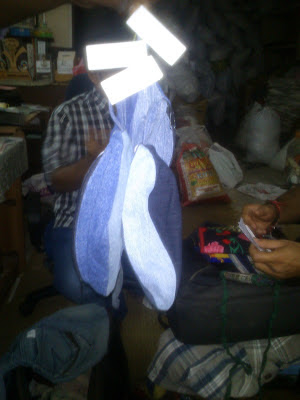Clothing is one of the basic necessities for our social
survival. Buying clothes is imperative on occasions as well as out of need. An
average income earner buys clothes three or four times a year. Gross 60% of the
population in a country like India buys clothes twice a year, and 20% buy just
once. It is during festivals like Diwali, Dussehra or EID that they buy
clothes. A corporate employee buys clothes every fortnight or less (a survey
revealed) mainly on weekends. Approximately, he/she will buy at least or
minimum 24 pairs a year. That’s no comparison with a common person or a daily
wage earner. So where do these clothes go? Closets or cupboards and stay there
long after the user moves on to newer clothes, rendering them useless.
During one of my visits to ‘Seva Mela’ (an exhibition
showcasing various NGOs in the city) last year, I encountered an interesting
NGO named ‘Goonj’. It is a Delhi-based organization, which works towards
eradicating various issues.
About Goonj -
Goonj is providing clothes & other basic amenities to
millions in the far-flung villages by turning urban wastage into resourceful
supply for rural India. Every month, over 80 tones of material reaches various
parts of the 21 states of India through a nationwide network of over 250
grassroot organizations, panchayats, Ashoka Fellows & social
activists.
You can contribute: old/new clothes (washed), woolens,
blankets, utensils, footwear (in pairs), dry ration, sewing machines,
umbrellas, school material, books, bicycle, spectacles, toys, newspapers,
magazines, used papers (only one face utilized) and money.
The clothes people donate to Goonj are given to the rural
and economically backward populace. But they don’t give it for free, they are
given as a reward to rural/slum communities who come together to undertake
various development activities such as road repair, well digging, pond
cleaning, constructing bamboo bridges, plantations etc. That sounds really
dignified isn’t it! Things which are easily grabbed are not valued, unless some
sort of worth is imparted to it.
After sorting, the unwearable /unusable materials are used
to create employment by converting them into more than 35 different products.
Bags and backpacks made out of jeans.
Strong pencil pouches for students made out of jeans.
Mobile pouches made from reels of audio/video cassettes, a
good handicraft work.
'Shaadi ka Joda' (bridal wear)
Goonj, supplies ‘Shaadi ka Joda’ (bridal wear) for orphan
couples without any rent. I was astonished to see that they donate four to five
dresses to both brides and grooms to perform the wedding rituals; after all,
it’s everyone’s dream to make his/her wedding an occasion to be remembered for
life...
Donation drive in the office
To support Goonj, and as a part of “Joy of giving week” we
organized a donation drive in the office. Placed huge cartons in our reception;
within a period of one week we collected a pile of things, that’s really a
great response! I thank all my Purpletalk* colleagues for contributing towards
a noble cause. Especially, I appreciate
Sachindra Pandey, a senior software engineer at Purpletalk, who initiated this
drive. The collection includes – clothes,
books, bags, shoes, electronic playing kits, stationary items, and monetary
contribution as well.
That’s a car full of things we received from the collection.
Cheers to all J










No comments:
Post a Comment